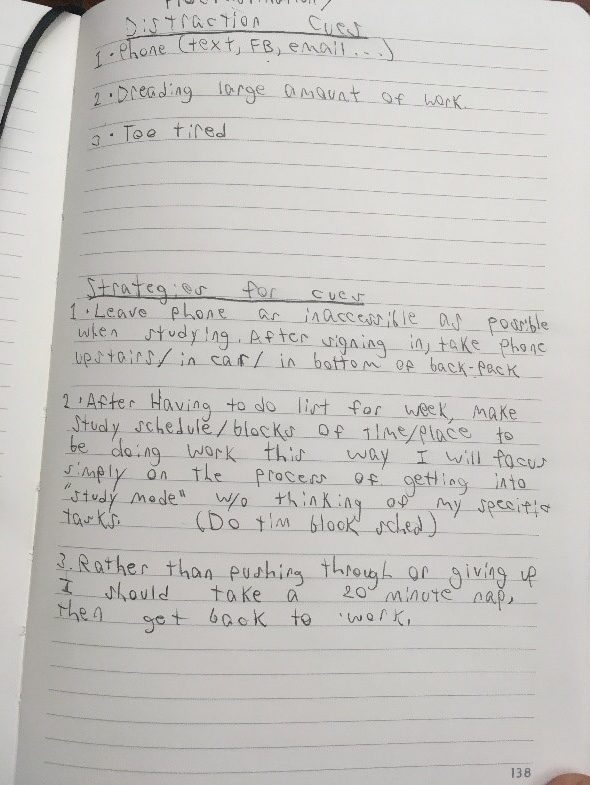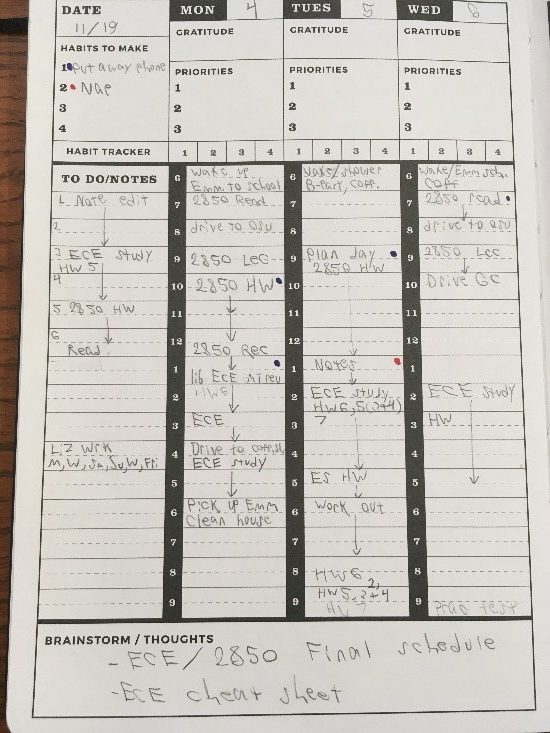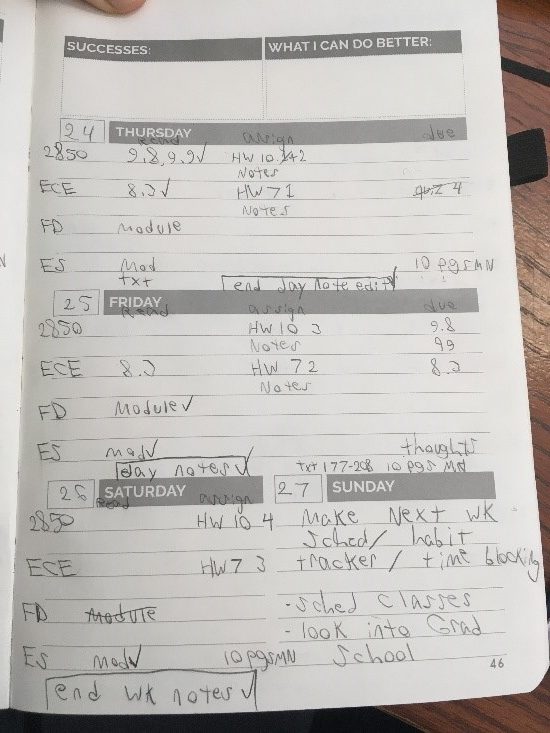My study methods are garbage. Now what??
Fall semester started and I decided my study methods just weren’t quite cutting it so I started wondering how to fix this problem. I am a Mechanical Engineering major and I feel like up to now I have sort of been haphazardly going about my studying and planning. I finally found a book that seemed to have a solution to my problem. A Mind for Numbers by Barbara Oakley gives a good general overview of how to study efficiently and how to overcome procrastination and is geared towards science majors (although anyone would find these strategies useful).
Make goals!
Before starting into my book, I needed to have some idea of what I wanted to get out of it. In other words, I needed to make goals.
I basically needed to start from scratch and completely overhaul my study techniques (or lack thereof…). I decided on a few general things. First was…PROCRASTINATION. The bane of students everywhere. I needed to first identify what was causing me to procrastinate and then find ways to overcome these procrastination cues.
I also wanted to work on my active studying to ensure I am understanding concepts and my mind isn’t drifting.
Finally, I wanted to ensure that I am continuously practicing the concepts that I have learned to create strong, what the author calls, “chunks,” which are essentially the pathways that are built in your brain as you learn new things. This is called spaced repetition.
A goal without a plan is useless!
Great! I have some goals. What do I do now??
Now that I had a more specific idea of what I wanted to fix, I could get to work and make a plan. A Mind for Numbers armed me with several strategies for overcoming these obstacles.
First, to tackle procrastination, the book talked about several strategies. The first thing that rang true to me was WHY we procrastinate. When you sit down to work on something that you are dreading even a little bit, your pain receptors flare up in your brain, so you do something that is less “painful” like check your email/ Facebook, etc. The things that cause you to feel this “pain” are cues that make you react a certain way based on habits. The best thing to do in this situation is “harness your zombies.” In other words, change your habits. If you change the way you react to cues that cause you to do what you don’t want to do, then your habits (zombies) work for you rather than against you. Also note, our habits like process a lot more than product, so focus on simply the process of spending time doing work rather than the outcome (product) and you will find that getting work done flows a lot better and it’s easier to start.
Next, “chunking.” There are various ways you make strong “chunks” but here’s what stood out to me… There’s top-down chunking and bottom-up chunking. Top-down chunking involves gaining context for what you’re learning, so you know why and when to use information. Bottom-up chunking is more focused practice and skills-based learning, and both are important.
For top-down chunking, simply ensuring I do the reading (actively, as in taking notes and ensuring my brain doesn’t wander) before class. This ties into lecture and note taking, which begins to bring the two chunking methods together by gaining more context and practicing problems (being active in lecture/ taking notes is very important!).
Finally, bottom- up chunking involves plenty of practice and repetition. I do this by editing and reviewing notes and making review questions based on my notes. I review notes after each day, week, and month to ensure I get practice as well as not losing information over time. While reviewing and testing myself, the author says that practicing “active recall” is by far the best method to study. I do this by quizzing myself. I use the review questions and attempt to recall information that I’m trying to learn.
So, to sum up. I wanted to make a list of procrastination cues and have corresponding strategies for them and to focus on process instead of product by time blocking to reframe getting assignments done into simply time that I spend working. Also, chunking… I wanted to make sure I was reading before class, taking good notes during lecture, and then reviewing those notes and practicing problems (actively) in spaced intervals by utilizing “active recall” (quizzing myself).
How it all went
I have made a lot of progress in active studying and developing new habits. I have seen a steady incline in my test and homework grades. Furthermore, I have found myself really enjoying what I am learning. I still have trouble keeping up with all the reading and note review that I want to be doing and applying my procrastination strategies all the time but the first step to achieving my goals was simply learning these strategies in the first place, which I now have to continue to practice and get better at. Changing habits takes time and work but has certainly been worth it up to now.
Measuring success
I used a few methods to track my progress. I used two types of daily planners and checked off when I had completed a task (e.g., reading before lecture/ editing notes) I have also made a list of cues and strategies to combat procrastination and would put a different colored mark during study session blocks where I used this strategy.
This is a list of “procrastination cues” along with strategies I used to overcome them.

This is my time blocking planner that allowed me to plan out blocks of time for studying as well as keep track of habits.

I used a separate daily/ weekly planner to check off my reading, note review, and assignments.

What I learned and where I go from here
Altogether I have learned a lot from this book and plan on looking back into it in following semesters, as I can always improve and refine my study habits. I have essentially learned how to learn, which was previously something I really didn’t know. Going to lecture, taking some notes and working on homework was enough before, but I never felt like I had a deep understanding of the material. Now, I feel as though I have the tools to learn deeply and efficiently even though I still need practice honing my learning skills and habits.
To sum it all up, the two main takeaways are…
- Learn to tame your zombies and make them work for you.
- Employ efficient chunking strategies (top down, bottom up, active recall, spaced repetition).
